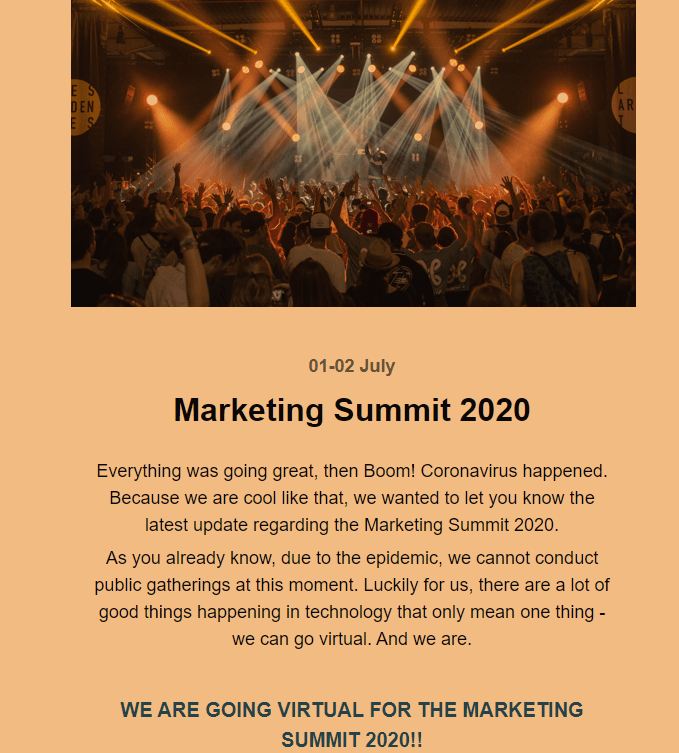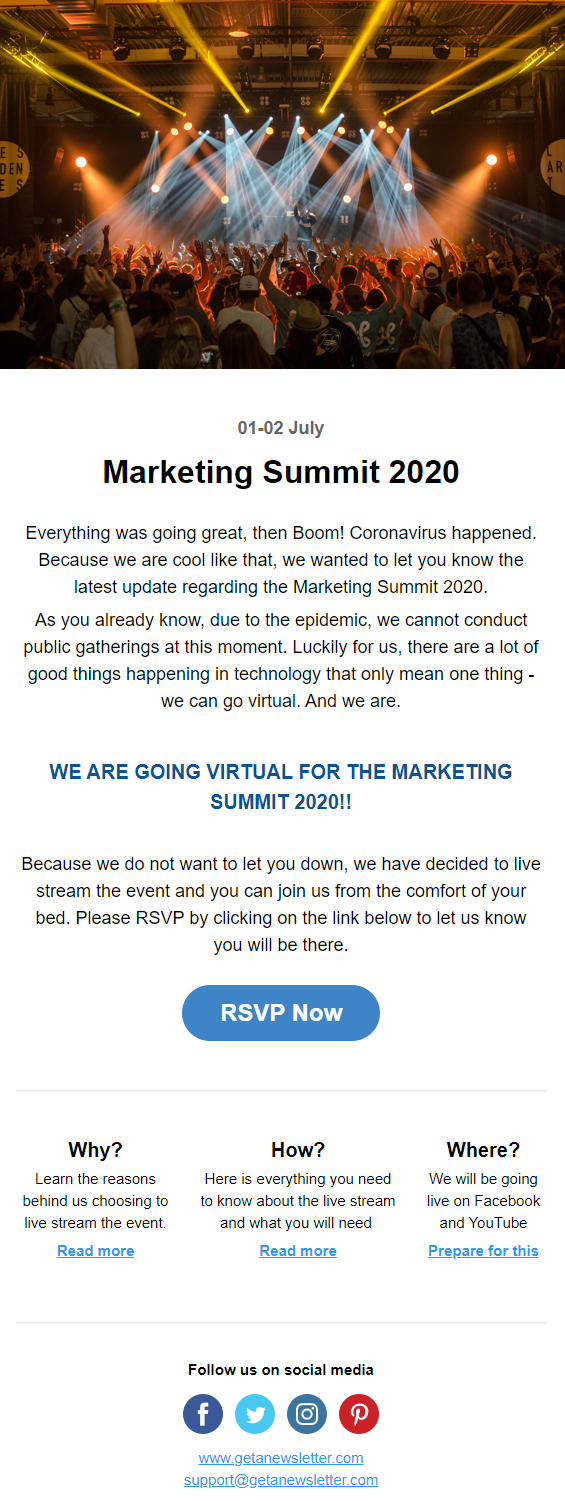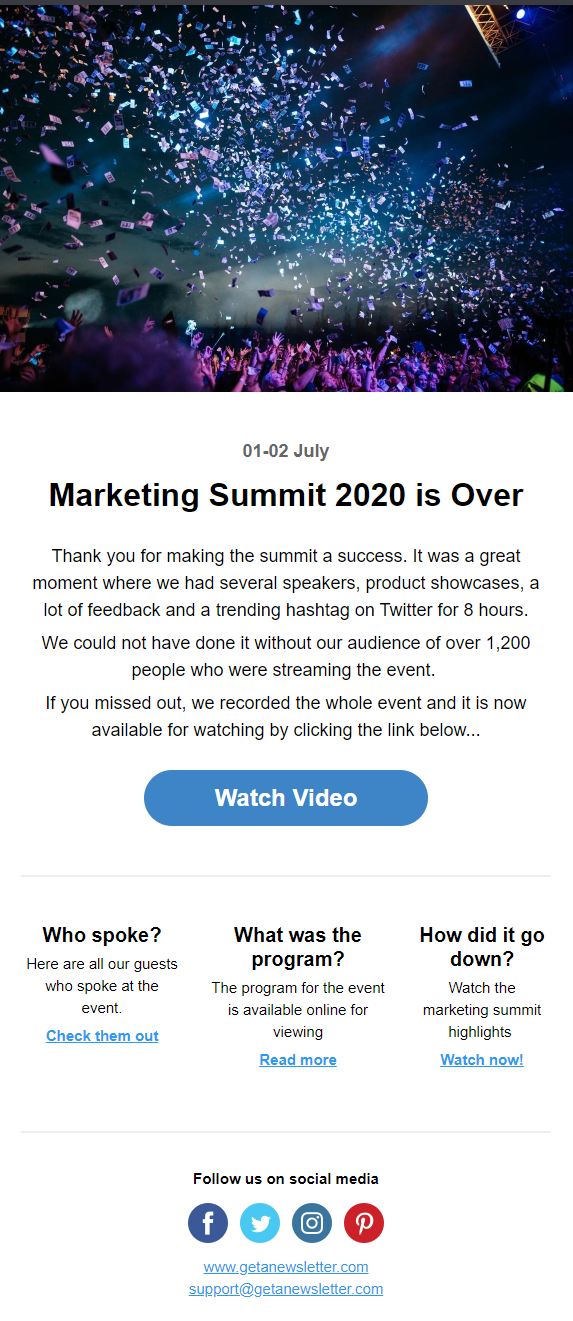First discovered in November 2019, coronavirus is now ravaging the world and causing havoc to world economies. Event businesses have suffered a masterstroke in the wake of the virus. People need to distance themselves socially, work from home and stay indoors by all means.
In this post, we will focus on the effects the coronavirus can have on your events business, and what countermeasures you can take to reduce the economic effects of the disease.
- Timeline of coronavirus
- Effects on event businesses worldwide
- What you can do to counteract the coronavirus effects
- AWESOME newsletter templates for event companies during this time
1. Timeline of Coronavirus
The disease caused by this coronavirus is now scientifically referred to as COVID-19 (Coronavirus Disease 2019). It has killed over 8,000 with over 200,000 confirmed cases globally. The World Health Organization (WHO) has called it a pandemic.
Italy has been the most hit by coronavirus after China. It is followed by Iran and Spain. 167 countries have confirmed cases of the virus. More countries are declaring a state of emergency.
The pandemic has caused businesses and governments around the world to impose a raft of measures to curb the spread of the virus.
The United States along with many other European countries like Italy and Spain have declared a state of emergency at the time of this writing, and a lot of other countries follow suit.
- Some countries like Italy have imposed a total lock-down in all towns. This has prevented free movement of people except for routine purchases of supplies every other day.
- A lot of countries like Germany, Denmark, Poland, Czech Republic and Slovakia have closed their borders – partially or completely.
- Social distancing – Some countries have advised a distance of at least 6ft between one person and another.
- People are now working from home if possible.
Schools have been shut down and all public gatherings cancelled. Most flights, upcoming events and conferences were suspended indefinitely around the world.
All these measures – while necessary – have hit the event industry hard.
2. Effects of Coronavirus on Event Businesses Worldwide

It’s not surprising that – with the lockdown and social distancing – the most affected businesses are in the events industry. Events are a daily occurrence in various fields.
From weddings at the very lowest level to big international events, everything is now at the mercies of the outbreak. Over 500 major events have also been cancelled, postponed to a later date, or suspended indefinitely.
For instance, here is a list of major events cancelled or suspended around the world:
Sports

Major leagues have gone on suspension until further notice. This include the NBA, Premier League, Euro 2020, The Masters, The Miami Open, National Hockey League and Formula 1 among others.
Music

Some of the most popular events that gather hundreds of thousands of people have also been cancelled. This include iHeart Radio Music Awards, Melbourne International Jazz Festival, Coachella, Tomorrowland Music Festival and Ultra Music Festival. This and more artists tours are now on the backdrop of the epidemic.
Tech

The cancelled conferences have amounted to losses of over $1 billion.
Some of the conferences that have been cancelled have been responsible for launching innovative tech products in the past. Some of them include:
- Barcelona Mobile World Congress
- F8
- Google I/O
- Oktane
- IBM’s Think and many more – compiled in a list here.
Film industry

Events that would launch movies such as Fast and Furious 9 and The New Mutants have all been postponed.
- TV productions like The Tonight Show With Jimmy Fallon and Saturday Night Live have also paused production.
Religious Events
- A good number of churches around the world have also halted their events.
The mentioned events above are some of the really big ones that attract thousands of people. For small to medium businesses, the number is 100x higher than that.

As the world races to achieve “flattening of the curve” above, it is increasingly likely that events businesses will be in for rough times with the following effects:
Losses for organised events

For all the events that were at the home stretch of preparations, events businesses are seeing an unprecedented loss of money. Cancellation of conferences, weddings, product launches, and other ceremonies that were already a few weeks out leads to time and money gone to waste.
Loss of potential future income
Events businesses are also experiencing cancellations from clients who had signed deals or contracts for events in the coming months. This means suppliers, planners and hosts have to forego any future income from these events.
Unemployment
As it goes, in such cases unemployment is a preceding problem. When you cancel events, so many people whose livelihoods depend on those events are at risk of losing their jobs. Loss of the job then means events businesses are not able to guarantee salaries or jobs for their workers.
The United States alone is at risk of losing jobs and driving the unemployment rate to 20% as a result of the coronavirus. The world at large is fearing a recession if the epidemic continues as stock markets continue crashing on a daily basis. Morgan Stanley and Goldman Sachs have declared that a global recession is underway.
The effects of something like a recession on events businesses could increase unemployment rates severely.
Delayed payments
Some events businesses face delayed payments as clients scramble to get money to clear invoices. Cancelled events most of the time translate to returned ticket monies to people who had booked the events. As a result, the organising company has difficulties paying the events businesses that helped with the planning.
Moreover, with uncertainty that comes from events suspensions, companies cannot guarantee to release payments to events businesses for services delivered. This is leading to delays as companies try to resolve the underlying issues.
Uncertainty in planning
Events businesses are now operating in very murky unclear waters. All the contracts they had signed have either been pulled back or postponed. This leaves very uncertain entrepreneurs who do not know how to plan the future or what it holds.
3. What can you do to counter the Coronavirus Effects to your event business?
What are some of the measures that small event businesses can take to ensure that their businesses are not extremely affected by the outbreak of coronavirus?
To begin with, small event businesses might not be hosting huge audiences for their events. This makes it possible to undertake the events in other ways while still following the required regulations and instructions from health officials.
Here are some of the countermeasures that can help:
Live streaming

Several companies have chosen to conduct virtual events instead of canceling or suspending indefinitely to reduce losses. Of course, for some events like music performances or movie releases, live streaming may not work. However, for small event businesses, live streaming provides an alternative avenue to host an event.
Using social media channels like YouTube and Facebook, event businesses can still host that talk, conference or product launches.
You might be wondering how you can get an emotional buy-in from your audience without the ability to effect that in person. Here are some tips:
- Come up with goals to guide the event
- Develop compelling messages and stories
- Switch to a format that improves remote experience. Forget about the slides and presentation you had prepared, or that speech your CEO wrote for you to read. Instead deliver an experiential live stream with a lot of ingenuity and engagement in person.
- Where possible, use interesting and professionally developed videos.
Webinars

Smaller events that need up-to 500 people can conduct webinars too. For events such as product demos, feature illustrations and launches, events businesses can easily switch up to use a webinar for more specialized communication.
In order to deliver an experience as good as an offline event, ensure you get a professional designer to work on your presentation. The success of the webinar will depend on it.
In addition, the following best practices for webinars should help:
- Keep your webinar between 30 and 45 minutes long.
- Do just one webinar per week if you have to do a series of them.
- Host your webinars on Tuesday, Wednesday or Thursday mornings.
- 92% of webinar attendees want a live Q&A session at the end of the webinar.
- Get as many signups as possible. Stats show that only a third of your signups will actually attend the webinar.
- The average number of webinar attendees is 148 people.
Newsletters

In order to update your attendees about the event during this coronavirus period, newsletters will come in very handy. Without proper updates, it is highly likely tat you will have your audience wondering why there has not been any communication.
Using newsletters, you can send a series of emails to explain to your audience that due to coronavirus the event is switching up to a virtual one. Whether it will be a live stream or a webinar, make that clear to them.
In addition, for live streams it is good to explain what the itinerary will be. Also, clarify whether the event speakers and participants remain the same. Let your attendees know where the live stream will be happening (Facebook, YouTube, etc).
For webinars, the event planners need to send out a series of invite emails to get people signed up for the webinar.
Finally, once the live stream or the webinar is over, event planners will need to share the links to the recorded event videos so that attendees who could not catch the virtual event can watch later.
Social Media updates
At this time of the epidemic, people are self-quarantined and socially distant in real life but not online. Social media is another good mode of communication aside from sending coronavirus newsletters.
Once you switch up your offline event into a virtual one, use social media too for the announcement. Post constant updates about the event in the days leading to it
4. Newsletter templates for event companies during the coronavirus time
In order to help you switch your event from an offline to a virtual event happening online due to coronavirus, we have made the following newsletter templates that you can use.
Email Sequence
Use a sequence of emails to wind down to the day of the event as you relay various emails.
Email 1: Announcement of virtual event due to coronavirus

In this email, you explain why the event has changed from an offline event to a livestream. It is important to make it clear that the coronavirus measures have caused the change. You also ask people to RSVP. This acts as a confirmation to gauge the reception of this news by your event’s attendees.
Email 2: Confirmation of speakers and program

In this email, you confirm that the event’s speakers will be attending and speaking on the virtual event. You also share an updated program for the event. Remember to share some humour.
Email 3: A last reminder to RSVP

As the day for the event approaches, you have to constantly remind people to RSVP so that no one misses out. This is only 3 days to the virtual event. It is a last call for the event’s attendees to RSVP so that you can get the probable final number of people who will attend the livestream.
Email 4: Share Livestream link

This is a simple email to invite everyone to join you on the livestream on the event day.
Email 5: Appreciation and Video Link

In this email you appreciate all who attended the livestream. In addition, you provide a link to the recorded video for those who were not able to watch the livestream. Also notice how we have the event highlights at the bottom right. You can send this out later as a main point of the email.
Are you in the events industry? We have put together a special advice package, FREE newsletter templates and a Get a Newsletter account.

Leave a Reply